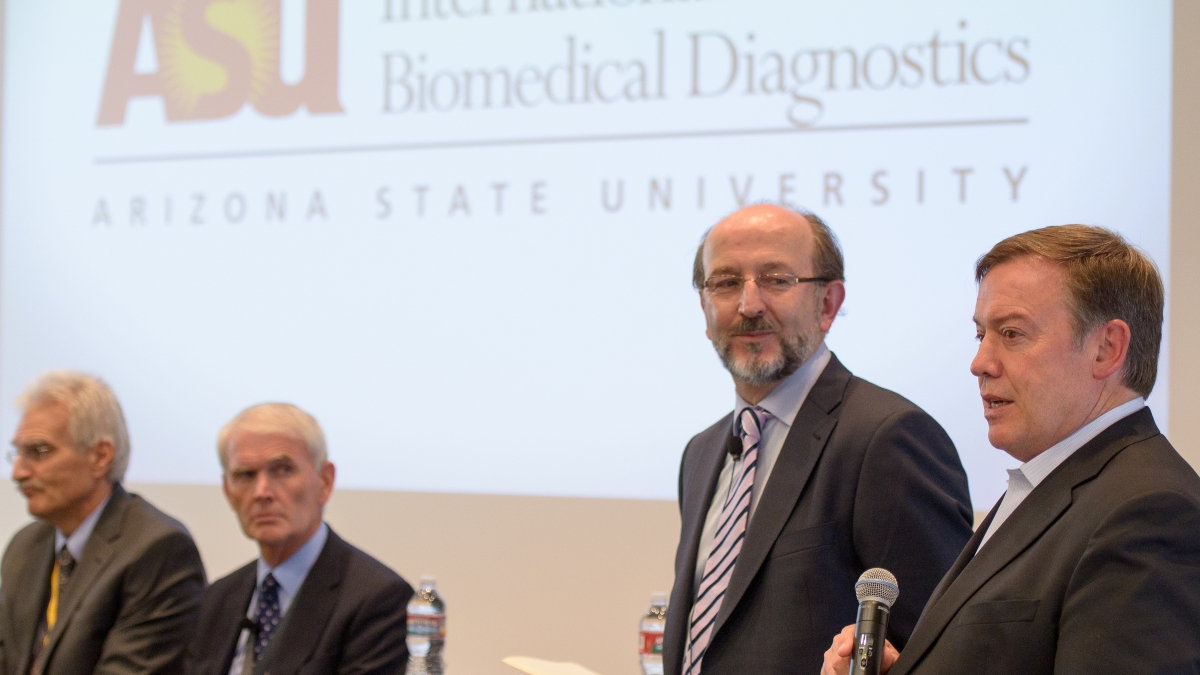Research, education goals draw ASU, Dublin City University closer

A “smart stadium,” a new International School of Biomedical Diagnostics, a center devoted to exploring healthy aging and the best approaches to digital learning were all on tap as Arizona State University and Dublin City University (DCU), Ireland, showcased their collaborative work.
Each of these projects was part of the Transatlantic Higher Education Partnership Inaugural Year celebration, held on the Tempe campus Nov. 7, a gathering that showed how ASU and DCU are similar in spirit and in ambitions.
Speaking about how ASU has differentiated itself in higher education with an emphasis on access, impact and excellence, President Michael Crow said, “We seek like-minded parties. There are few schools around the world that are trying to do what we are trying to do. We feel a kinship with DCU, and we are excited about taking the relationship to the next level.”
Alan Harvey, DCU’s vice president for research and innovation added that “DCU is Ireland’s youngest university and, I would say, it’s most dynamic. We are keen to work with ASU. While our scales of operation are different, our ambitions are similar.”
The day’s activities were a mix of updates and workshops on existing ASU-DCU projects, opportunities for faculty to mingle and possibly explore collaborations for future projects.
One major part of the celebration was an event marking the launch of the International School Biomedical Diagnostics. Crow and DCU President Brian MacCraith, along with many of the first class of ASU students were on hand to celebrate it’s opening.
The school is designed to prepare students to take on roles of greater responsibility and impact within biomedical diagnostics and related health care fields.
“With the Master of Science in Biomedical Diagnostics degree program, ASU and DCU are bridging diagnostics with other related disciplines to solve real-world problems,” said Crow.
“Diagnostics play a vital role in health care innovation. They are involved in more than 60 percent of clinical decision-making, and the industry employs more than 3.5 million people worldwide,” added MacCraith.
The Master of Science in Biomedical Diagnostics is a one-year degree program with shared curriculum and courses offered by ASU and DCU. The program is delivered through a global classroom experience, focusing on the technology, science, business and practical application of biomedical diagnostics. The program culminates in an applied Practicum Project, which each student completes with industry and academic partners.
On Friday evening a Research Showcase was held at Old Main. The showcase provided an opportunity for several ASU-DCU project teams to display their work, show their capabilities and talk about future plans. ASU and DCU profiled some of their successful research and education projects in areas such as health technology, digital learning, smart cities and sustainability, and healthy aging.
Some of the highlighted projects were:
Smart stadium
In a novel transatlantic collaboration, the Smart Stadium Initiative will use ASU’s Sun Devil Stadium renovation project and Ireland’s Croke Park Stadium as the venues for deploying pilot "Internet of Things" technologies to test their capabilities in these unique environments. The goal is to use technology to enrich the fans experience and in-stadium engagement, as well as improving safety and emergency response, crowd movement and control, and traffic management. Intel is involved in the project.
At the showcase event, DCU demos included a 3-D game that allows users to pit their skills at Gaelic games against an elite athlete, personalized game highlights with social media commentary directed to your mobile device in a stadium, and the ability to upgrade your seats during the game based on sensing your location in the stadium. ASU showed the use of facial expression recognition to enrich the fan experience.
Healthy aging
The CHAnge Center for Healthy Aging will employ sensor and information and communications technology to real-life, person-focused applications in society. The objective is to create an environment where community health data can be collected and analyzed (old and young), and will act as a living lab on both university campuses.
DCU has begun creating its living lab, which will house a community clinical assessment facility for early detection of diseases such as dementia, development of technology for health intervention management and to serve as an education and training facility for the older community. ASU is exploring ways to bring a living laboratory to the ASU community that complements those of DCU and reflect the diversity of its population.
Digital learning
Of all of the technologies exhibited at the showcase event, digital learning was about the most direct way of extending reach over the Atlantic.
Both DCU and ASU are committed to designing education for the future. DCU and ASU already provide students with a strong future-focused curriculum and rich digital learning experience. DCU offers this through "DCU Connected," a suite of online courses and programs to students living throughout Ireland and beyond, and ASU offers a comprehensive range of online degree programs through ASU Online.
“The showcase helped us demonstrate how ASU and DCU are committed to redesigning higher education for the 21st century,” said Mark Brown, director of the National Institute for Digital Learning and a professor at DCU. “We share significant research and curriculum design expertise in developing new models of teaching and learning which exploit the affordances of new digital technologies.”
According to Sean Hobson, vice president of strategic design and development for ASU Online, digital learning plays a vital role in enhancing the education of today’s students.
“We provide the support mechanism to enable the academic programs of ASU and DCU,” Hobson said. “The power of it is that we provide access – like ASU student access to DCU faculty and their perspectives. We are the enabler of faculty on both sides to expand their reach and access.”